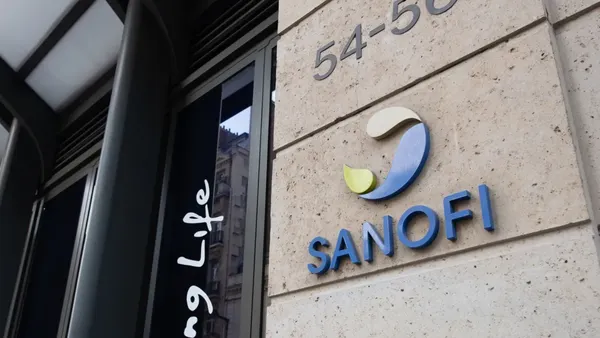Dive Brief:
- Novo Nordisk shares tumbled 7% in early trading Wednesday after the company reported lower-than-expected revenue from its blockbuster obesity franchise.
- Even as revenue from Wegovy and Ozempic continued to soar, the second-quarter numbers failed to reach the high expectations set by Wall Street, analysts said. Sales of the so-called GLP-1 obesity drugs were about 9% below consensus estimates, according to analysts with the investment bank Jefferies.
- Overall revenue for the second quarter was “borderline in line with expectations,” Stifel analyst Eric Le Berrigaud wrote in a note to clients. But the fact that older products in Novo Nordisk’s portfolio helped offset the disappointing results for obesity drugs “is not so reassuring in the long term,” he wrote. The company’s “sales composition is not good.”
Dive Insight:
Novo Nordisk has struggled at times to meet the overwhelming demand for Ozempic and Wegovy, which has held back sales of the medications. The Danish drugmaker also flagged a negative impact from rebates in the U.S. market in the most recent earnings report.
Still, the drugs continued to make significant year-over-year revenue gains. Wegovy sales jumped 74% to 21 billion Danish kroner, or about $3.1 billion, in the first half compared with the year-earlier period, while revenue from Ozempic climbed 36% to 56.7 billion Danish kroner, Novo Nordisk said.
The company raised its overall forecast for sales growth for the year to between 22% and 28%, compared with a range of 19% to 27% in its first-quarter update. But it now expects a slightly lower range for operating profit growth of 20% to 28%, hurt by the failure of an experimental hypertension medicine. In its first-quarter release, Novo Nordisk forecast an operating profit growth of 22% to 30%.
On a conference call, Novo Nordisk executives focused on the rapidly increasing prescription rate for the drugs and assured investors that the company’s ability to manage supply is improving. Indeed, Novo Nordisk plans to spend $4.1 billion on a new factory in North Carolina and has been buying up plants that can help with the fill-and-finish aspect of producing the injectable medicines.
The company is looking to shore up its franchise as the competition increases in an obesity drug market that analysts say may someday top $100 billion a year. Rival Eli Lilly has been investing heavily in manufacturing facilities as well. And Roche, Viking Therapeutics, Amgen and Pfizer are among the many companies pushing to deliver new options.
On the clinical side, Novo Nordisk has been ahead of rivals in showing that Wegovy can not only help patients lose weight, but also reduce the risk of heart attacks, strokes and death in patients with a history of heart disease. That’s helped the company win Medicare reimbursement for the medicine in a subset of patients.
But Novo Nordisk did say Wednesday that it’s decided to withdraw a submission to the Food and Drug Administration that showed benefits for Wegovy in reducing heart failure symptoms such as fatigue and breathlessness after discussions with regulators. It plans to resubmit in early 2025 with more data from a clinical study called FLOW. Lilly recently released research showing its rival drug Zepbound could reduce the risk of death or serious complications among heart failure patients.












